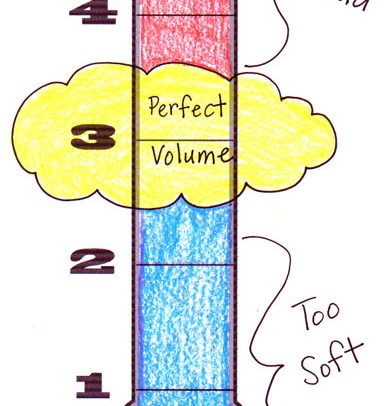Raboyseyee and Ladies:
This week we have the great pleasure of wishing mazel tov to Daniel Newman, he the son of our longtime friends -decades mamish- Sari Newman and Perry Newman, upon his upcoming wedding -tonight mamish. Daniel will be marrying Rachel Leah Friedman, she beautiful daughter of Diana and Robert Friedman. We look forward to joining you and wish Rachel Leah and Daniel a beautiful life together in marital bliss. Mazel tov to both extended families.
And in late breaking news -7:00AM this morning- everyone’s good buddy and excellent caterer, Chaim Richter of Richter Caterers – https://richtercaterers.com/ sent over a WhatsApp announcing that he and his eishes chayil Ruchi became grandparents for the first time. Mazel Tov! Mazel tov to the parent’s Sara and Yitzi Richter and to the entire Richter family. Welcome to the world baby Richter and may you bring much nachas and joy to your entire family.
——————————————————————————————————————-
The Sounds of Near Silence
Welcome to Parsha Ki Sovoi which is lite on mitzvos – some say five, others say it contains six of the 613 to be delivered in total- but very heavy in rebuke and threatened punishments. For that reason and despite anything else going on in the parsha, Ki Sovoi is most well-known for the 98 curses awaiting the Yiddin. Moishe dedicates a full 54 pisukim (Devorim 28:15-68) out of 122 warning the Yiddin about the unspeakable curses the RBSO will shower upon them should they veer away from His heylige Toirah. Disobedience has consequences. They are not pretty to read, and many have reported nightmares, incidents of bedwetting, night sweats, raised blood pressure, and heart palpitations after reading them. Is this what the Yiddin expected when they agreed to marry the RBSO? The good news: Yom Kippur is mamish around the corner and the RBSO is looking forward to forgiving kimat all the sins you committed this past year. Thankfully, He’s generous with second and even more chances. More good news: In a few short weeks, we start all over again by saying hello to the world, to Adam, Chava and let’s not forget the snake that caused the original sin.
Parshas Ki Sovoi is efsher also famous for another striking contrast, this one in sound—one that involves not the words of the text itself, but how that text is read or chanted aloud or quietly in shuls all over the world. We shall explore all that below, but first this.
Just last week, in Parshas Ki Saytzei, the RBSO -seemingly in a good mood- recognized the needs of the fighting soldier and rewarded him with booty, if you chap. This week, the mood has seemingly changed and the Yiddin are being threatened with a slew of curses -98 to be exact. After reading them, one might conclude that instant death by COVID might be preferred over what’s in store. Is the RBSO moody, chas v’sholom? Does the RBSO have a love/hate relationship with His people? This week we’re being threatened with annihilation mamish? Is this why He took His people out of Mitzrayim and into the Promised Land? What’s wrong with a little stability?
 It’s a dovor yoduah (plainly understood) that congregational rabbis -most- frown upon congregants who leave the shul for a break they call the ‘kiddish club’. It’s a time when its members exit -sometimes en-masse- and make a bee line to someone’s locker, or at times, to a mini watering hole where they enjoy Kiddush over their favorite scotch- single malt only, tequila, or other drink of choice. There, while sharing a few lechaim’s (drinks), they talk about their wives and other persons of interest, if you chap. They also discuss the rabbi, ideas on how to fix the shul (any), his contract, politics, Biden’s foibles, what’s doing in Israel, business matters, corona and shoin, by the time it’s over, and after imbibing the kiddish club required minimum number of drinks in but 5-10 minutes, the world’s problems are solved. If only it were that easy. They are zicher glad, happy mamish; and isn’t that what the RBSO wants of us? Grada, so the parsha tells us; perplexingly, not being happy while serving the RBSO may be the root cause of all the listed curses.
It’s a dovor yoduah (plainly understood) that congregational rabbis -most- frown upon congregants who leave the shul for a break they call the ‘kiddish club’. It’s a time when its members exit -sometimes en-masse- and make a bee line to someone’s locker, or at times, to a mini watering hole where they enjoy Kiddush over their favorite scotch- single malt only, tequila, or other drink of choice. There, while sharing a few lechaim’s (drinks), they talk about their wives and other persons of interest, if you chap. They also discuss the rabbi, ideas on how to fix the shul (any), his contract, politics, Biden’s foibles, what’s doing in Israel, business matters, corona and shoin, by the time it’s over, and after imbibing the kiddish club required minimum number of drinks in but 5-10 minutes, the world’s problems are solved. If only it were that easy. They are zicher glad, happy mamish; and isn’t that what the RBSO wants of us? Grada, so the parsha tells us; perplexingly, not being happy while serving the RBSO may be the root cause of all the listed curses.
 Ober this week as we get ready to read the parsha, it wouldn’t be a terrible idea for the rabbis to order the entire congregation to join the kiddish club, or at least, a fire drill and emergency evacuation just as the baal koirah (Toirah reader) gets set to read the aliya containing the klolois (curses). The bottom line: the pisukim dedicated to the rebuke are not for the faint of heart. Moishe does not mince words. Farkert: what he describes is horrific, Armageddon like, and not at all pleasant. That’s the bad news. The good news? Most of us won’t get to hear them and even fewer will follow along as the reader speeds his way through them. Why not? That’s what our sages of yore tell us; it’s not for us. What’s pshat not for us? As it turns out, our chachomim (wise sages) chapped the terrible side effects of listening to the Toichocho and the deleterious effects it could have on an individual’s psyche, and on the entire minyan. They decided it’s not for us to hear. And for that reason, it’s taka the minhag (custom) -in most shuls- that the reader of the heylige Toirah delivers them in an undertone. What’s pshat? Pshat is that the reader lowers his voice, speeds up the pace and the net result is that unless you’re close by, or mamish straining to pay attention, you won’t hear much, if anything. Oy vey! Ober, are we allowed to miss the laining? Say it’s not so please. Shoin, to solve this problem, our sages have instructed the reader to lower his voice and speed up the pace, ober not so low and not so fast that one misses hearing the laining. How low can he go? How high? Ver veyst? How fast and how slow? Seemingly, the reader must juggle between high and low, fast and slow. The burden is on us to hear or make believe we’re hearing. Wait there’s more: given that our sages didn’t want to embarrass the many sinners in each shul, to spare them from being singled out, and efsher humiliated for having been called up when these pisukim are being read, it’s also a minhag is some shuls to honor the rabbi with this aliya. Taka many rabbis could benefit from hearing them; moreover, which rabbi doesn’t enjoy the shishi aliya? In other shuls, the reader himself is called to the Toirah.
Ober this week as we get ready to read the parsha, it wouldn’t be a terrible idea for the rabbis to order the entire congregation to join the kiddish club, or at least, a fire drill and emergency evacuation just as the baal koirah (Toirah reader) gets set to read the aliya containing the klolois (curses). The bottom line: the pisukim dedicated to the rebuke are not for the faint of heart. Moishe does not mince words. Farkert: what he describes is horrific, Armageddon like, and not at all pleasant. That’s the bad news. The good news? Most of us won’t get to hear them and even fewer will follow along as the reader speeds his way through them. Why not? That’s what our sages of yore tell us; it’s not for us. What’s pshat not for us? As it turns out, our chachomim (wise sages) chapped the terrible side effects of listening to the Toichocho and the deleterious effects it could have on an individual’s psyche, and on the entire minyan. They decided it’s not for us to hear. And for that reason, it’s taka the minhag (custom) -in most shuls- that the reader of the heylige Toirah delivers them in an undertone. What’s pshat? Pshat is that the reader lowers his voice, speeds up the pace and the net result is that unless you’re close by, or mamish straining to pay attention, you won’t hear much, if anything. Oy vey! Ober, are we allowed to miss the laining? Say it’s not so please. Shoin, to solve this problem, our sages have instructed the reader to lower his voice and speed up the pace, ober not so low and not so fast that one misses hearing the laining. How low can he go? How high? Ver veyst? How fast and how slow? Seemingly, the reader must juggle between high and low, fast and slow. The burden is on us to hear or make believe we’re hearing. Wait there’s more: given that our sages didn’t want to embarrass the many sinners in each shul, to spare them from being singled out, and efsher humiliated for having been called up when these pisukim are being read, it’s also a minhag is some shuls to honor the rabbi with this aliya. Taka many rabbis could benefit from hearing them; moreover, which rabbi doesn’t enjoy the shishi aliya? In other shuls, the reader himself is called to the Toirah.
Ober this custom – grada widely accepted- begs the following questions: why bother reading them? On the one hand, of course, we have to read them; if the Toirah has them, we read them! Ober, if all the words of the heylige Toirah are from the RBSO and are all zicher holy, why do these words seemingly have less importance by being read quietly? If our sages so decreed, and if one cannot hear the reader anyway, and by extension, if one has no idea what the reader is saying, and, if one is not in the mood to be admonished with words that according to some, Moishe Rabaynu himself decided to give over after the RBSO had already forewarned (back in Parshas Bichukoisai) about punishments with His own list of 49 individual punishments, why not leave the shul for the reading? Shoin, if ever there was a long run-on sentence, that was it! Who needs this? Do we go to shul to get aggravated? To leave with raised blood pressure? Not! To come home frightened out of our hoizen (pants)? Also not! Few if any return from the kiddish club in a bad mood. Why do we taka read the Toichocho this week? And why taka is it read quickly and quietly?
Let’s try to chap this: if the minhag is for these pisukim to be read in an undertone, we must conclude that the reader does not want us to hear what is being read and mistama, it’s not us he is has in mind. The warning is for others. Which others? Ver veyst? Avada we are clean of sin and have no need to hear the admonitions. Is that the case? NOT! On the other hand, efsher we can ask azoy: Why taka do we not courageously face the curses and read them aloud with the understanding that our own terrible actions come with a price? Has not the RBSO -over and again- in the heylige Toirah warned us about disobedience? Has He not had thousands killed for bad behavior? He has! Is ignoring them efsher dangerous?
Or, is pshat azoy: Do we listen better and absorb more if one speaks quietly? Does whispering get a person’s attention? Can a whisper become a roar and wake us up? Is there power to the soft whisper? Does the absence of sound result in a certain energy? Did our sages -who were so very learned in the heylige Toirah- chap that the heylige Toirah provides at least several examples of the drama achieved through sound and the lack of it? Let’s recall the thunder and light show on Har Sinai; that shook the people up. They were frightened and immediately entered into the marriage agreement with the RBSO. Let’s also harken back to the silence of Aharoin when Nodov and Avihu were killed. He said nothing, not a sound. The bottom line: sounds, or the lack of them, call us to attention. Says the Sefer on customs (ספר המטעמים) azoy: given that the curses are words of rebuke, the way for people to accept them is to say them softly. Those who yell the loudest don’t necessarily win the argument. Veyter.
Ober, we ask azoy: What are we trying to communicate with all of this acoustic drama? How does this sudden decrease in volume make us feel? What does this practice of chanting quietly with occasional contrasts in sound, communicate to us as we engage with the words of these pisukim? And where does this tradition come from, and what does this practice signal to those listening?
Says the heylige Gemora (Migilah 31a) that a fellow by the name of Ezra enacted a takona (executive order) requiring that these admonitions be read while we are still in the month of Elul. Why? Says the heylige Gemora veyter, azoy: Ezra Hasoifer (the Scribe) instituted the public reading of the Toichocho in Vayikra 26:14-43 before Shavuos and that of Devorim before Rosh Hashono so that “Tichleh shono u`klaloseha” – “Let the year and its curses come to an end”. The Gemora has more, this time in the form of a good gematria: The 98 curses are equivalent to the word (צח) meaning shiny and clean, and the word forgive (סלח.) Gishmak. Shoin, since we mentioned Ezra and one of his executive order, we should also mention that according to some, we eat meat on Rosh Hashono because of another of his enactments. Says the heylige Novee (Nechemia 8:9-10), azoy:
| 9- Then Necemiah-he is Hattirshatha-and Ezra the priest, the scholar, and the Levites who caused the people to understand, said to all the people, “This day is holy to the Lord your God; neither mourn nor weep,” for all the people were weeping when they heard the words of the Law. | טוַיֹּ֣אמֶר נְחֶמְיָ֣ה ה֣וּא הַתִּרְשָׁ֡תָא וְעֶזְרָ֣א הַכֹּהֵ֣ן | הַסֹּפֵ֡ר וְהַֽלְוִיִּם֩ הַמְּבִינִ֨ים אֶת־הָעָ֜ם לְכָל־הָעָ֗ם הַיּ֚וֹם קָדֹֽשׁ־הוּא֙ לַֽיהֹוָ֣ה אֱלֹֽהֵיכֶ֔ם אַל־תִּֽתְאַבְּל֖וּ וְאַל־תִּבְכּ֑וּ כִּ֚י בוֹכִים֙ כָּל־הָעָ֔ם כְּשָׁמְעָ֖ם אֶת־דִּבְרֵ֥י הַתּוֹרָֽה: | |
| 10– And he said to them, “Go, eat fat foods and drink sweet drinks and send portions to whoever has nothing prepared, for the day is holy to our Lord, and do not be sad, for the joy of the Lord is your strength.” | יוַיֹּ֣אמֶר לָהֶ֡ם לְכוּ֩ אִכְל֨וּ מַשְׁמַנִּ֜ים וּשְׁת֣וּ מַמְתַּקִּ֗ים וְשִׁלְח֚וּ מָנוֹת֙ לְאֵ֣ין נָכ֣וֹן ל֔וֹ כִּֽי־קָד֥וֹשׁ הַיּ֖וֹם לַֽאֲדֹנֵ֑ינוּ וְאַל־תֵּ֣עָצֵ֔בוּ כִּֽי־חֶדְוַ֥ת יְהֹוָ֖ה הִ֥יא מָֽעֻזְּכֶֽם: |
Over the years, many have argued over what type of meat is to be eaten on Rosh Hashono. In earlier days, when the heylige Ois to be was still a child, this was understood to be a sweet brisket, ober in our days, according to many, one may now serve any beef to include roast beef, ribs, short ribs and even corned beef. Of course, you can get all these delivered to your door from Prairie Street Prime, a company we shouted out last week. Shoin, we’ll give them one more. Order yours here: https://prairiestreetprime.com/collections/usda-prime-beef.

Elul is of course the month that precedes the High Holy days and we are to be thinking of repentance daily as we hear the shoifer being blown. Grada the heylige Ois has been blowing the shoifer daily. There’s no real tshuva in sight but the blowing is getting better daily. Ezra was famous for a few takonis. On the other hand, efsher we should read this parsha on Yom Kippur, a day when we are in general way more receptive to being admonished and threatened? We read and recite other frightening passages that day and we klap (beat our chests) a few hundred times; adding a little toichocho couldn’t hurt. And wouldn’t Yom Kippur, the day we tell the RBSO how sorry we are for being shlecht, for chapping what we shouldn’t have, for bad-mouthing the innocent, for spreading false rumors, and the list goes on, be a better day to hear these? Isn’t Yom Kippur the day we make promises, albeit at times falsely, to the RBSO that we will be better Jews and people this year, a good day to hear these?
The heylige Gemora marks these verses as ones to be handled specially and carefully. Says the heylige Gemora (M’gillah 31b), azoy: the lists of curses cannot be interrupted: they cannot be split into two aliyot and read by two different people. Rather, one person reads all of them. The Gemora asks: From where are these matters derived? Why does one not interrupt the reading of the curses? Rebbe Chiya bar Gamda said that Rebbe Asi said: For the verse states: “My son, do not despise the chastening of the Lord, nor be weary of His correction” (Proverbs 3:11). If one makes a break in the middle of the curses, it appears as if he loathes rebuke.
And says The Kitzur Shulchan Aruch (a summary of the Shulchan Aruch written by Rabbi Yoisef Karo), azoy: The curses contained in Parshas Bechukosai and in Parshas Ki Sovoi should be read without interruption (M’gillah 31). Interrupting would make it appear as though we do not wish to accept Divine admonition. … And also, the curses in both parshas should be read in a low voice. The law code makes clear not only that we should read the curses quietly, but also that we should punctuate the recitation by returning to a regular or loud voice during the sections that reinforce positive associations—such as the middle and end of Devorim 28:58, which reference the name of the RBSO with reverence. According to the Kitzur Shulchan Aruch, it is not enough for us to approach this passage simply with a passive gloss on the meaning of the curses; we also must engage in ritual theater to emphasize and enact our emotional connections to this text.

Shoin, let’s chazir: The passages chanted in sotto voce (in a quiet voice, as if not to be overheard), are the ones that outline the awful consequences people will reap if they do not follow the RBSO’s commands. Why? One pshat – seemingly popular suggests that the custom of reading the curses in a muted voice might be related to the “ayin horo” (fear of the evil eye). One of the arguments is that if the person who reads those passages reads them with certainty and in a loud voice, those awful consequences will indeed materialize. Mention bad stuff too loudly and bad stuff happens! The reader and the congregation prefer not to dwell on such a possibility, and therefore choose to recite these passages quickly and softly. Grada that sounds logical; who is not afraid of the boogey man? In other fancier words, for some, the practice of the quiet tones is almost akin to apotropaic magic—the practice of warding away evil with signs, symbols, and rituals. In this understanding, the near silence is a protection, a community sanctioned safety ritual to distance ourselves from both the sins and the consequences listed in this portion.
But who in the congregation is to be called up to the Toirah for this reading? Who gets shishi? Those who grew up in smaller shuls – shtiebels- know that the rebbe of the shul (aka: the Ruv) always gets called up for the shishi aliya and it so happens that punkt it’s the shishi aliya that contains the rebuke. And the question is azoy: does the rebbe’s ego demand he gets shihi anyway? Or, does the embarrassment of the rebuke force him to make a choice and skip his aliya that week? In either scenario it’s an ego issue. As stated above, it could be considered an insult to be given the aliyah in which these terrible punishments are spoken out loud. Shoin to resolve this issue of potential embarrassment, and as mentioned above, often the reader himself goes up to the Toirah to spare a member of the congregation the embarrassing and unpleasant situation of reading such strong admonitions.
A story brought down -efsher apocryphal, ver veyst, goes like this: Back in the old country, the members of a certain shul were all terrified of being called up for the aliya of the toichocho. What to do? They called a board meeting, and decided that the best course to take was to hire someone for a specific fee to take that particular aliya. Tracking down this individual who would take the ‘dreaded’ aliya, proved to be somewhat harder of a chore than expected. But, in the end, a candidate was found and engaged. Came the shabbis of the toichocho, the gabbai looked around for the contracted individual to call him for the aliya. But this individual was nowhere to be found in the shul. “Perhaps he’s simply late,” suggested one of the members, “let’s wait a few minutes for him.” They sat for about a quarter of an hour, getting more and more impatient by the minute. After all, this was not proper. An agreement had been made. Money had been paid. Where was he? Thankfully, before things got out of hand, the contracted individual entered the shul. Immediately, a few members ran to him and demanded to know the reason for his tardiness. The individual calmly turned to the angry group, and replied, “I was davening in the shul down the block. Do you actually think one can make a living from only one toichocho?” Did the myseh mamish take place? Ver veyst?
Ober, does everyone agree that the reader is to lower his voice during the toichocho? Of course not! Said Rabbi Joseph Lookstein (z”l) that, in his view, the admonition section should be read loudly and slowly in order to fully impress upon those present how important it is for them to avoid those actions that might trigger divine wrath. The bottom line: seemingly it’s not only what is being read that counts, but the way a passage is read that has an impact on the audience. It is also evident that there is an opening for individual interpretations of some of these customs. Rabbi Lookstein was not alone and at least one famous rebbe who survived the Holocaust but lost 11 children. Argued that it be read aloud. He argued that all the punishments described in the 98 curses had already taken place and there was no reason worry about the ayin horo.
The bottom lines: it appears that in some way, the sudden silence – the undertone- calls us to attention, and jolts us out of regularity just as much as the shofar rouses us from our slumber. The dramatic drop in volume commands us to be alert and aware. There are times when we need loud sounds, thunder and light to get the message. And times when the still, small voice, the soft, murmuring sound—the kol d’mamah dakah (Literally: The voice of a thin silence; Idiomatically: A whisper / Utter silence) gets the job done. It also commands us to lower our own voices when schmoozing with our friends in shul during the laining.
 Final note: if you’re wondering why so serious this week, here’s the scoop. The heylige Ois took his third vaccine Tuesday morning at 9 AM. At 9PM, his body began to shake like a lulav and his temperature spiked. All day Wednesday he was in bed with fever. Tomorrow the post must be delivered early to the webmaster as he’s traveling. The bottom line: the humor cells were affected; back next week at full capacity.
Final note: if you’re wondering why so serious this week, here’s the scoop. The heylige Ois took his third vaccine Tuesday morning at 9 AM. At 9PM, his body began to shake like a lulav and his temperature spiked. All day Wednesday he was in bed with fever. Tomorrow the post must be delivered early to the webmaster as he’s traveling. The bottom line: the humor cells were affected; back next week at full capacity.
A gittin Shabbis –
The Heylige Oisvorfer Ruv
Yitz Grossman
